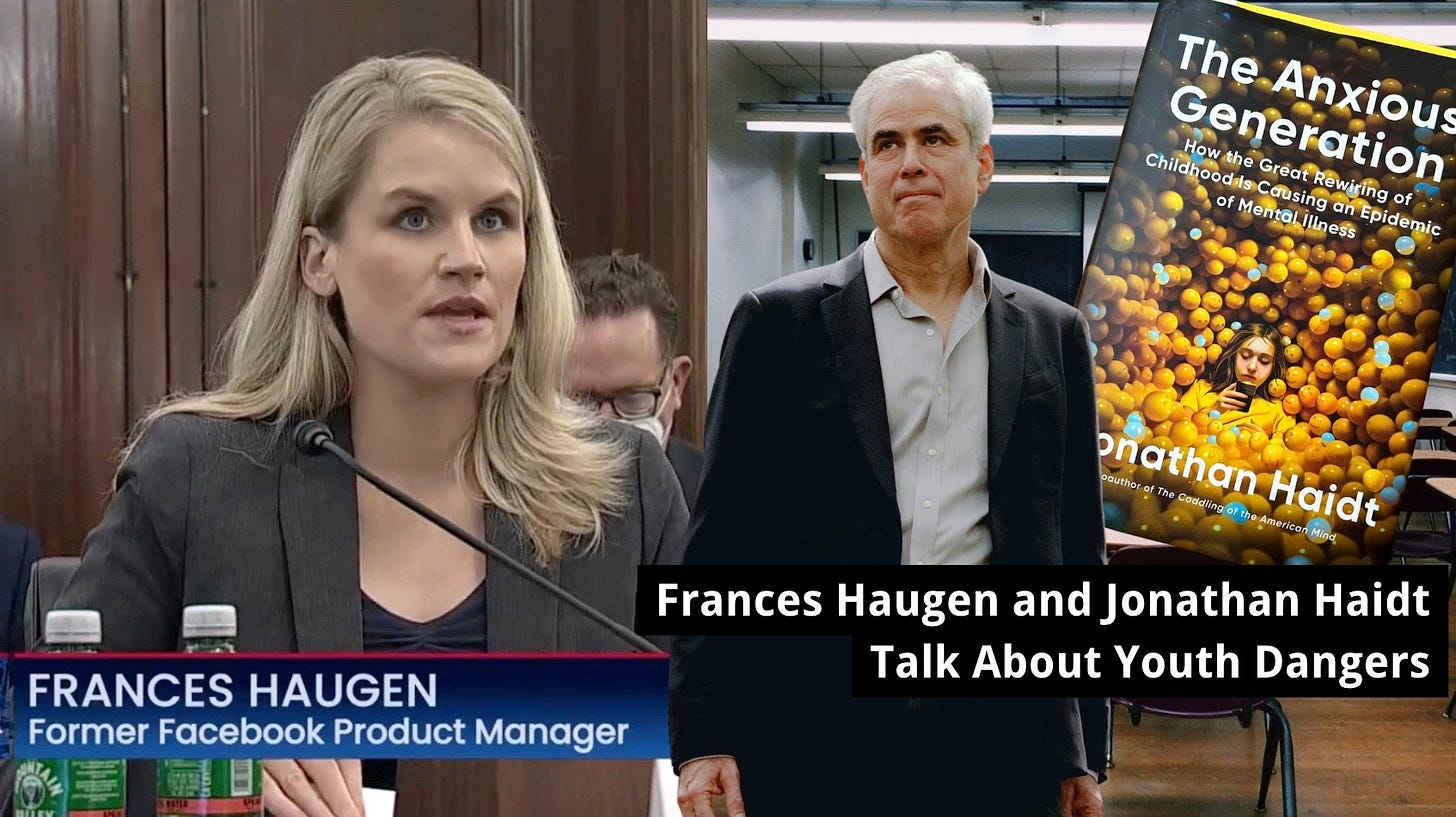Building A Digital Future For GenZ: Frances Haugen, Jonathan Haidt Talk About Youth Dangers
Social media today stands at a crossroads, much as tobacco did decades ago. We now know the harm it causes, especially to young users, and we have the tools to hold platforms accountable. It's time to turn the tide and ensure these companies prioritize the well-being of their users over profits.
Frances Haugen's whistleblowing efforts exposed the inner workings of social media algorithms, sparking global conversations about their impact. She is no stranger to the complexities of social media's influence, especially on youth. Reflecting on the power and flaws of these platforms, Haugen has stated: "The algorithm doesn't know what it's showing; it only knows what gets you to click. This fundamental design flaw allows harmful content to proliferate, creating widespread societal harm. We need transparency and accountability across all platforms to ensure public safety."
Both Haidt and Haugen recently joined the Sustainable Media Center Board of Advisors. "Jonathan Haidt's research on social media's societal impacts and Frances Haugen's advocacy for accountability bring invaluable expertise to the Sustainable Media Center, strengthening our mission to create healthier digital ecosystems," Said Steven Rosenbaum, SMC's Executive Director.
In a recent interview, Haugen expanded on the unique challenges faced by children in the digital landscape: "The data is very clear. You can have a kid on social media between the ages of 10 and 13, and even if they stop using it, traces of its impact remain detectable in brain scans years later. These are network-based problems. A single child or family cannot tackle them alone if their friends remain online."
Haugen has also stressed the dangers of algorithms that push users toward extreme content. "We trust computers to direct our attention," she said, "but what we get is more and more of the extreme stuff. There are ways to design algorithms to make them less harmful, but without accountability, companies have little incentive to implement them."
Her advocacy includes pushing for consumer rights that empower users to reclaim control over their digital interactions. "We shouldn't have to choose between our memories, our friends, and a fresh start with algorithms," she emphasized, proposing a bill to allow algorithm resets and greater user control.
Jonathan Haidt's voice has been pivotal in understanding the mental health crisis exacerbated by social media. His research sheds light on the alarming rise of depression, anxiety, and self-harm among young people.
At a recent SMC event, Haidt expanded on these ideas, calling attention to the societal implications of two key laws, Section 230 of the Communications Decency Act and COPPA: "A couple of giant companies basically control our children's social lives," he said. "They've been given incredible protections. They don't have to check anyone's age, they're not liable for the content they show, and they're among the most powerful companies in the world. The idea that these companies host our children's childhood and adolescence with no liability or responsibility is completely insane."
Haidt reflected on the broader need for comprehensive legislation to address the digital crisis facing youth today: "We need to start asking serious questions about how to design laws that actually prioritize children's mental health. While there are attempts at piecemeal legislation, the real solution lies in systemic reform that includes robust age gating, transparency requirements, and accountability for platforms hosting harmful content."
He also highlighted the cultural shift driven by digital platforms: "We've normalized a level of vile antagonistic behavior online that would have been unthinkable a decade ago. Social platforms have rewired not just childhood, but public discourse itself, fostering an environment where antagonism and division thrive. This is as much a cultural crisis as it is a technological one."
Reflecting on the long-term implications, Haidt painted a stark contrast between the real-life memories of past generations and today's digital childhood:
"Do you want the childhood your parents had, where they had freedom, fun, and adventures? Or the one kids have now, entirely online, where in fifty years they reminisce about Fortnite Battle 27362? By denying them real-life childhood and giving them screens instead, we're facing the largest destruction of human capital in history, except for the World Wars."
Both Haugen and Haidt recognize that the harms of social media are not isolated phenomena but deeply embedded in its design and monetization strategies. Haugen pointed out in her interview: "Social media companies spend more on lobbying than almost any other organization. They've turned obstruction into an art form. Imagine if they redirected those resources toward meaningful change instead of profit-driven optimization."
Haidt added to this sentiment, emphasizing the role of collective action: "These are not issues any one family, school, or community can solve alone. We need broader social and legislative changes to create an environment where kids can grow up healthy, resilient, and supported."




